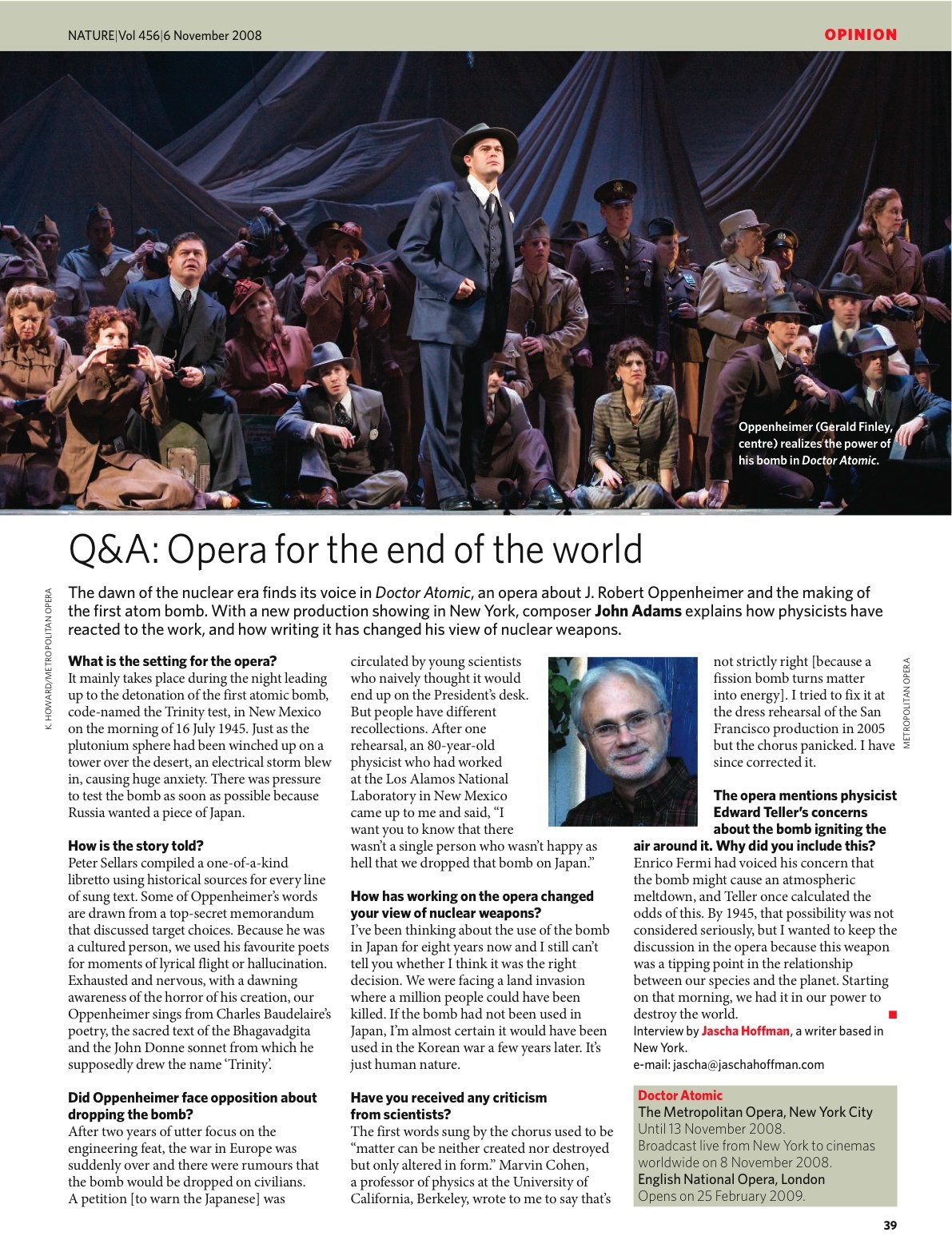
Q&A: Opera for the end of the world
Nature 456, 39 (6 November 2008)
The dawn of the nuclear era finds its voice in Doctor Atomic, an opera about J. Robert Oppenheimer and the making of the first atom bomb. With a new production showing in New York, composer John Adams explains how physicists have reacted to the work, and how writing it has changed his view of nuclear weapons.
Q&A: Opera for the end of the world
What is the setting for the opera?
It mainly takes place during the night leading up to the detonation of the first atomic bomb, code-named the Trinity test, in New Mexico on the morning of 16 July 1945. Just as the plutonium sphere had been winched up on a tower over the desert, an electrical storm blew in, causing huge anxiety. There was pressure to test the bomb as soon as possible because Russia wanted a piece of Japan.
How is the story told?
Peter Sellars compiled a one-of-a-kind libretto using historical sources for every line of sung text. Some of Oppenheimer's words are drawn from a top-secret memorandum that discussed target choices. Because he was a cultured person, we used his favourite poets for moments of lyrical flight or hallucination. Exhausted and nervous, with a dawning awareness of the horror of his creation, our Oppenheimer sings from Charles Baudelaire's poetry, the sacred text of the Bhagavadgita and the John Donne sonnet from which he supposedly drew the name 'Trinity'.
Did Oppenheimer face opposition about dropping the bomb?
After two years of utter focus on the engineering feat, the war in Europe was suddenly over and there were rumours that the bomb would be dropped on civilians. A petition [to warn the Japanese] was circulated by young scientists who naively thought it would end up on the President's desk. But people have different recollections. After one rehearsal, an 80-year-old physicist who had worked at the Los Alamos National Laboratory in New Mexico came up to me and said, "I want you to know that there wasn't a single person who wasn't happy as hell that we dropped that bomb on Japan."
How has working on the opera changed your view of nuclear weapons?
I've been thinking about the use of the bomb in Japan for eight years now and I still can't tell you whether I think it was the right decision. We were facing a land invasion where a million people could have been killed. If the bomb had not been used in Japan, I'm almost certain it would have been used in the Korean war a few years later. It's just human nature.
Have you received any criticism from scientists?
The first words sung by the chorus used to be "matter can be neither created nor destroyed but only altered in form." Marvin Cohen, a professor of physics at the University of California, Berkeley, wrote to me to say that's not strictly right [because a fission bomb turns matter into energy]. I tried to fix it at the dress rehearsal of the San Francisco production in 2005 but the chorus panicked. I have since corrected it.
The opera mentions physicist Edward Teller's concerns about the bomb igniting the air around it. Why did you include this?
Enrico Fermi had voiced his concern that the bomb might cause an atmospheric meltdown, and Teller once calculated the odds of this. By 1945, that possibility was not considered seriously, but I wanted to keep the discussion in the opera because this weapon was a tipping point in the relationship between our species and the planet. Starting on that morning, we had it in our power to destroy the world.
Interview by Jascha Hoffman, a writer based in New York.